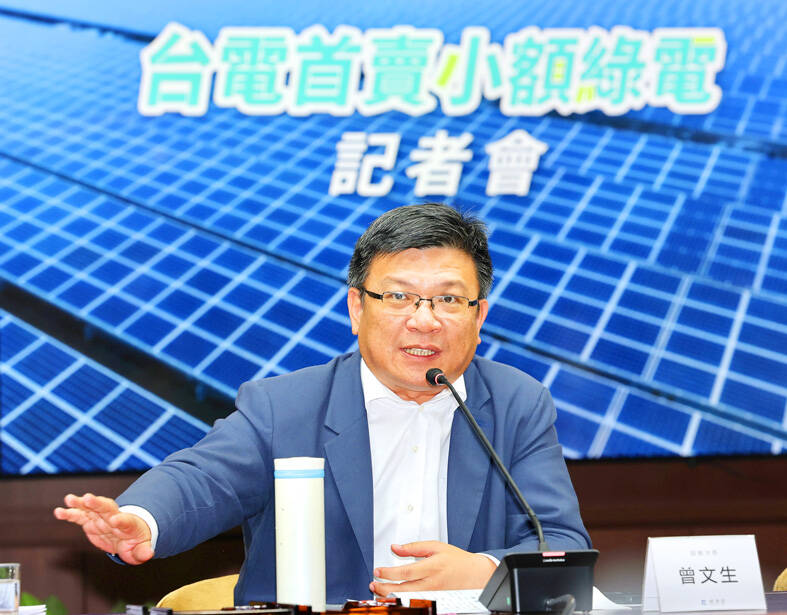Power plants in Taiwan could be turned into energy parks that use decarbonization technology to help the nation produce electricity more efficiently, Deputy Minister of Economic Affairs Tseng Wen-sheng (曾文生) said on Friday.
Tseng, who doubles as chairman of Taiwan Power Co (Taipower, 台電), said during a seminar about electricity that the power industry must improve on automation, digitalization and availability (the amount of time equipment is available for production) to meet the needs of an electrified society.
An electrified society requires the use of electricity in a more efficient manner, and it would test Taipower’s ability to employ a wider variety of energy sources to produce, transmit and distribute power, Tseng said.

Photo: CNA
With the nation expected to use increasingly more green energy, the company expects by the Lunar New Year in 2030 there could be periods in which the amount of power generated exceeds overall demand, Tseng said, adding that there is a need to develop a plan to ensure electricity is not wasted.
Under President Tsai Ing-wen (蔡英文), Taiwan aims to generate 50 percent of its electricity with natural gas by 2030, followed by renewable energy at 27 to 30 percent and coal at 20 percent.
Energy storage systems or using wind power to produce hydrogen could be two ways to meet the challenge of excess power production, Tseng said.
“Low carbon energy parks” is an idea that the company has proposed for future natural-gas-based power plants, incorporating both existing gas-fired generator sets, and wind power and new technologies such as hydrogen-producing stations, along with carbon capture and storage, he said.
Power plants in Taichung, Miaoli County’s Tongsiao Township (通霄) and Taoyuan’s Datan Borough (大潭) — all located near offshore wind power farms — would likely be pilot project candidates, Tseng said.

The US dollar was trading at NT$29.7 at 10am today on the Taipei Foreign Exchange, as the New Taiwan dollar gained NT$1.364 from the previous close last week. The NT dollar continued to rise today, after surging 3.07 percent on Friday. After opening at NT$30.91, the NT dollar gained more than NT$1 in just 15 minutes, briefly passing the NT$30 mark. Before the US Department of the Treasury's semi-annual currency report came out, expectations that the NT dollar would keep rising were already building. The NT dollar on Friday closed at NT$31.064, up by NT$0.953 — a 3.07 percent single-day gain. Today,

‘SHORT TERM’: The local currency would likely remain strong in the near term, driven by anticipated US trade pressure, capital inflows and expectations of a US Fed rate cut The US dollar is expected to fall below NT$30 in the near term, as traders anticipate increased pressure from Washington for Taiwan to allow the New Taiwan dollar to appreciate, Cathay United Bank (國泰世華銀行) chief economist Lin Chi-chao (林啟超) said. Following a sharp drop in the greenback against the NT dollar on Friday, Lin told the Central News Agency that the local currency is likely to remain strong in the short term, driven in part by market psychology surrounding anticipated US policy pressure. On Friday, the US dollar fell NT$0.953, or 3.07 percent, closing at NT$31.064 — its lowest level since Jan.

The New Taiwan dollar and Taiwanese stocks surged on signs that trade tensions between the world’s top two economies might start easing and as US tech earnings boosted the outlook of the nation’s semiconductor exports. The NT dollar strengthened as much as 3.8 percent versus the US dollar to 30.815, the biggest intraday gain since January 2011, closing at NT$31.064. The benchmark TAIEX jumped 2.73 percent to outperform the region’s equity gauges. Outlook for global trade improved after China said it is assessing possible trade talks with the US, providing a boost for the nation’s currency and shares. As the NT dollar

The Financial Supervisory Commission (FSC) yesterday met with some of the nation’s largest insurance companies as a skyrocketing New Taiwan dollar piles pressure on their hundreds of billions of dollars in US bond investments. The commission has asked some life insurance firms, among the biggest Asian holders of US debt, to discuss how the rapidly strengthening NT dollar has impacted their operations, people familiar with the matter said. The meeting took place as the NT dollar jumped as much as 5 percent yesterday, its biggest intraday gain in more than three decades. The local currency surged as exporters rushed to